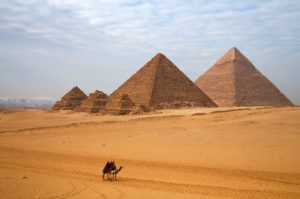
When you think back to stories you learned about ancient civilizations when you were in school, you most likely think about a few key locations. You will think about the Greeks, maybe even the Mayans, and you will also inevitably think about the Egyptians. Ancient Egypt has been prominently focused on in textbooks across the world due to how much information has been uncovered about this civilization. Still, most people also probably forget most of the details surrounding these fascinating tales.
Now is as good a time as any to refresh yourself on some of the more engaging and intriguing stories of the old world. Take a look at some of these myths from Egypt’s past and discover the wonderful and wild world for yourself.
The Beginning
The religion of ancient Egypt was quite similar to that of other older civilizations. Egypt, like Greece, had a pantheon of gods and goddesses the people would turn to for guidance. As with all religions, there is a myth for how the world came to be. The origin story of Egypt tells that the world was once void of all life and comprised mainly of a primordial water. From this water rose the god Atum. The god was said to have created himself, rising from the water and creating a hill because there was not any land to stand upon.
Though Atum is often referred to with masculine pronouns, it is important to note he was not specifically male. Many ancient texts leave Atum without gender, as he was the first form of life and an embodiment of both male and female potential. This is evidenced in the fact that Atum was able to give birth to the god Shu and goddess Tefnu, a feat myths attribute to either the act of masturbation or Atum mating with his own shadow. Atum’s children set to creating order from the primordial sea, and soon life came to the world.
Light and Death
The myths surrounding death in ancient Egypt are equally as intriguing. Anubis is one of the more well-known gods of Egypt’s early days. This is largely due to the fact that Anubis was the god associated with death, burial, and mummification. Since scholars and academics have gotten a vast amount of data about Egypt from tombs and pyramids, it makes sense Anubis would be quite present. One of the main jobs Anubis held was weighing a human’s heart after death. The Egyptians believed a person with a light heart was worthy of entering the afterlife.
Tales of death state a person’s heart would be weighed on a scale against a feather from the headdress of the goddess Ma’at, who herself represented the idea of “truth.” Should a person’s heart prove lighter than the feather, the person’s soul would be allowed into the afterlife. According to most texts, a person’s heart could only be light when a person committed to kind actions, good deeds, and a less serious approach to most matters.
Embalming Adventures
Embalming was an important ritual for Egyptians, and the techniques discovered during these early days helped to shape modern preservation techniques. The reason for embalming is connected to the myth of Isis, the mother goddess of ancient Egypt. After Isis lost her beloved husband Osiris, she preserved and buried his body with magical techniques. Embalming is a way of respecting the fall of Osiris and Isis’ love for her husband, as well as preparing the dead to “rise again” whenever Osiris did.
Though there is a wealth of information available about ancient Egypt, many people forget some of the finer points. Exploring the myths of the past can help to shed light on the present and uncover some fascinating truths about the human experience.

